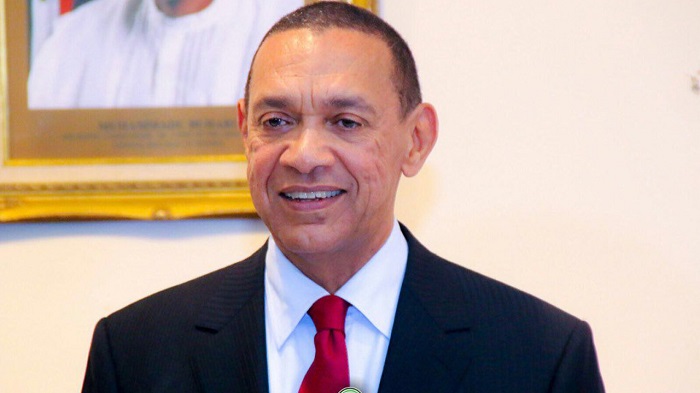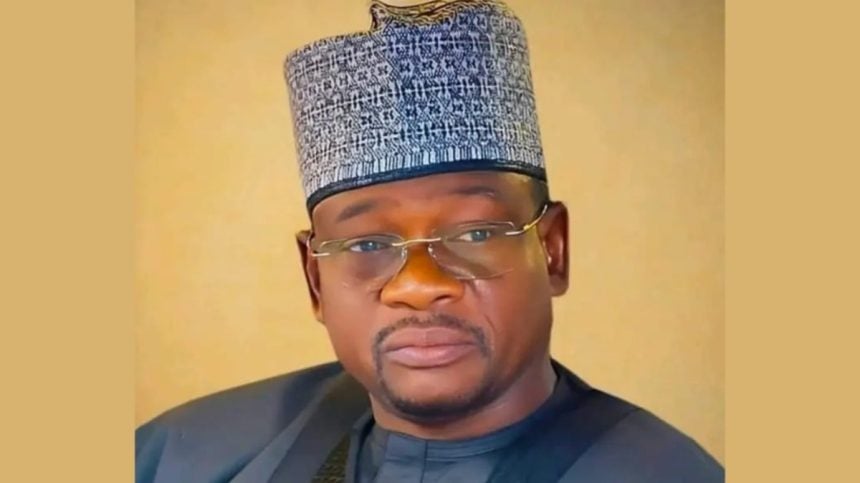News
Former Court of Appeal Justice, Ahmad Belgore is dead

A retired Justice of the Court of Appeal, Ahmad Olanrewaju Belgore, is dead.
The Chairman of the Nigeria Bar Association, Ilorin Branch, Kwara State, Kamaldeen Gambari, announced his death on Tuesday.
“Information reaching me now indicates that Hon. Justice Ahmad Olarewaju Belgore, PCJA (retd.) is dead. May Allah forgive his shortcomings,” Gambari said in a social media post, as reported by Leadership Newspaper.
Belgore retired as the Justice of the Court of Appeal on April 18, 2023, on the attainment of the retirement age of 70.
Meanwhile, in a condolence message, the Emir of Ilorin and Chairman, Kwara State Traditional Rulers Council, Alhaji Ibrahim Sulu-Gambari described the death of Justice Belgore as a big loss to the Ilorin Emirate and nation at large.
The Emir, in a statement by his spokesman, Abdulazeez Arowona, said, “This is a great and colossal loss that has befallen the Ilorin Emirate and humanity at large.
“It is with shock that I received the news of the demise of Justice Ahmad Belgore. He was a complete gentleman, a thorough judicial officer who served the nation meritoriously in various capacities, nationally and internationally.
“He was one of the finest justices that the Ilorin Emirate has ever produced. He contributed in no small measures to the growth and development of the judiciary and humanity in general.
The Emir commiserated with the immediate and extended family members of the deceased as well as the entire people of Ilorin and Nigerians in general.

News
Coalition: ‘2027 election is going to be easiest for Tinubu’ – Yahaya Bello

Yahaya Bello, former governor of Kogi, says the 2027 elections will be the “simplest, easiest” for the ruling All Progressives Congress (APC) and President Bola Tinubu.
Bello spoke on Saturday at a rally in Isanlu in Yagba east LGA of Kogi while welcoming a group of politicians who were defecting to the APC.
Bello declared that the wave of defection translates to Kogi becoming a “one-party state,” adding that Nigerians will keep Tinubu at Aso Rock till 2031.
“Today, Kogi state house of assembly is going to be one. There would be no minority leader again. The minority leader in the state house of assembly is decamping today,” Bello said.
“Kogi is a one-party state. And, by the special grace of God, come 2027, I have said it before that there is no vacancy in Aso Rock. Tinubu’s mandate was given to him by Nigerians, and they will say to him, ‘hold this mandate until 2031’.
“Who is doing more coalition when everybody is coming to our party? The 2027 election is going to be the simplest and easiest for APC and the president.”
News
2027: Minister of Power, Adelabu declares to run for governorship election

Minister of Power, Adebayo Adelabu, has declared his intention to contest the 2027 governorship election in Oyo State, promising to reclaim the state from the Peoples Democratic Party (PDP).
Adelabu, who was the All Progressives Congress (APC) governorship candidate in the 2019 elections, made the declaration on Friday during consultations with party leaders and stakeholders across Ogbomoso and Oyo zones.
Speaking at the residence of a party leader, Ayoade Adeseun, in Ogbomoso, Adelabu said the meetings were part of his grassroots engagement and a step towards building a formidable coalition ahead of the polls.
“I’m here to tell you that I want to contest for governor of Oyo State in 2027,” Adelabu told party members. “I’m ready to put to test all the experience I’ve gathered from the past two elections.”
He assured stakeholders that the APC would not impose any aspirant on the party, adding, “I’m up to the task, I want to show them that I can withstand and survive competition and come out victorious.”
The minister, who appealed to aggrieved members for forgiveness, emphasised the need for unity within the APC in Oyo, urging members to focus on reclaiming power from the PDP.
“We should be concerned with how the party will come back to power in 2027,” he said. “Ogbomoso is very important in this state’s politics. I’m happy to see that all factions here are now united.”
Governor Seyi Makinde of the PDP, currently in his second and final term, is expected to support a successor.
During his visit to Oyo town, Adelabu said he is read to run an inclusive government if elected.
“I will run an all-inclusive government where everybody will be involved in the governance of the state and no one will be left behind,” he said. “Oyo zone deserves better treatment because it is symbolic. Oyo is historical, symbolic, and a blessing to the entire state.”
He also used the occasion to rally support for President Bola Tinubu’s re-election in 2027.
“This is another turn of Yorubas to serve their two terms as President of Nigeria. Nigeria has a lot to benefit if Tinubu is re-elected,” Adelabu declared.
News
AMCON lists Silverbird’s Abuja Mall for sale over Murray-Bruce debt

The Asset Management Corporation of Nigeria (AMCON) has listed the Silverbird Entertainment Centre in Abuja for sale to recover a longstanding multi-billion naira debt linked to a former Nigerian Senator, Ben Murray-Bruce, and his companies.
The listing, published in a recent public notice by AMCON, shows that the Abuja Mall, a prime commercial complex located in the Central Area, Cadastral Zone, is now open for bids from interested buyers. The property is among several assets AMCON disposes of across different states, including Lagos, Rivers, Oyo and Plateau.
The Abuja mall, operated under Silverbird Entertainment, was previously seized following a 2016 Federal High Court order over a debt of more than N10 billion owed to AMCON by several companies owned by the Murray-Bruce family. Those affected include Silverbird Productions Limited, Silverbird Showtime Limited and Silverbird Galleria Limited.
In June 2016, the court appointed a receiver, M.A. Banire, to take over the companies’ assets on AMCON’s behalf. Justice C.M.A. Olatoregun, who presided over the matter, also barred Mr Murray-Bruce, his brothers Guy and Roy Murray-Bruce, and other family members from interfering with the receiver’s work. The court’s order covered several mortgaged properties in Abuja, Lagos, and Port Harcourt.
Despite negotiations that followed the initial seizure, the debt remained unresolved. AMCON said the latest sale is part of a broader asset recovery strategy targeting high-profile debtors who have failed to meet their obligations.
Silverbird’s Abuja mall is one of the group’s flagship properties, housing retail shops, a cinema, restaurants and office spaces. According to AMCON’s notice, the property comes with a gross lettable area of 15,050.91 square metres and is being sold as is.
Senator Ben Murray-Bruce, who served in the National Assembly representing Bayelsa East from 2015 to 2019, is also a prominent media entrepreneur and founder of the Silverbird Group, which operates television and radio stations in Nigeria and Ghana, as well as the Most Beautiful Girl in Nigeria (MBGN) beauty pageant.
As of 2017, AMCON said over 400 high-profile obligors were responsible for about N4.5 trillion nearly 80 per cent of the total outstanding debt on its books. The Corporation has since adopted more aggressive recovery efforts, including asset sales and legal enforcement.
Bids for the Abuja mall and other listed properties are due by 11 July.
Prospective buyers are advised to visit AMCON’s official website or contact the designated coordinating agents for details.
Murray-Bruce did not respond to a request for comment on the planned sale as of the time of filing this report.
News
Tinubu, 5 governors arrive Brazil for BRICS meeting

President Bola Ahmed Tinubu has arrived in Rio de Janeiro, Brazil, to participate in the 17th Summit of Heads of State and Government for the Global South and Emerging Economic Bloc, which includes Brazil, Russia, India, China, and South Africa (BRICS).
The President’s flight touched down at the Galeao Air Force Base tarmac at 8:45 pm on Friday, where the Galeao Air Force Base Commander coordinated the Guard of Honour.
Brazil’s Deputy Minister for Africa and the Middle East, Ambassador Carlos Sergio Sobral Duarte, and the Deputy Minister for Trade Promotion, Science, Technology, Innovation, and Culture, received President Tinubu.
President Tinubu is in Brazil at the invitation of President Luiz Inacio Lula Da Silva. The Nigerian leader will attend a bilateral meeting hosted by President Lula today, July 5, ahead of the summit on June 6 and 7.
At the BRICS Summit, the President will participate in a plenary session and deliver an address on Nigeria’s ongoing reforms to reposition the economy for global competitiveness.
According to the Presidency, he will also attract investors to capitalise on the country’s opportunities in agriculture, solid minerals, healthcare, and alternative energy.
The summit’s theme is “Strengthening Global South Cooperation for More Inclusive and Sustainable Governance.” Deliberations will centre on health, Artificial Intelligence, governance, and Climate Change issues.
Ahead of the Leaders’ Summit, the political negotiators of BRICS brainstormed over aligning more commitments to combat socially determined diseases, artificial intelligence governance, and climate finance.
State Governors participating in the summit with the President are Hyacinth Alia (Benue), Prince Dapo Abiodun (Ogun), Babajide Sanwo-Olu (Lagos), Sheriff Oborevwori (Delta) and Mohammed Umar Bago (Niger).
News
APC appoints Ali Bukar Dalori as acting National Chairman

The All Progressives Congress (APC) has appointed Hon. Ali Bukar Dalori as the acting National Chairman of the party following the resignation of Dr. Abdullahi Umar Ganduje.
Dalori, who currently serves as the Deputy National Chairman (North), was directed by President Bola Ahmed Tinubu to assume the leadership role in an acting capacity pending the meeting of the party’s National Executive Committee (NEC), which is being convened immediately to fill the vacancy.
The announcement was contained in an official statement signed by the party’s National Publicity Secretary, Felix Morka, on Friday in Abuja.
According to the statement, Ganduje tendered his resignation with immediate effect in order to attend to “urgent and important personal matters.”
Dalori’s appointment comes nearly two years after Ganduje was appointed National Chairman in August 2023, succeeding Senator Abdullahi Adamu.
During his tenure, Ganduje was praised for promoting party cohesion, driving electoral strength, and overseeing key defections into the party.
With Dalori now at the helm, the APC said it remains “steadfast and unwavering” in delivering President Tinubu’s Renewed Hope Agenda and sustaining internal unity.
The party expressed gratitude to Ganduje for his “invaluable contributions and distinguished record of service” and extended well wishes for his future endeavours.
News
Fresh details as Tinubu signs tax reform bills into law

President Bola Tinubu has signed the four tax reform bills into law. Tinubu assented to the bills at the Presidential Villa on Thursday.
The four proposed laws are the Nigeria tax bill, the Nigeria tax administration bill, the Nigeria revenue service (establishment) bill, and the joint revenue board (establishment) bill.
The signing ceremony was attended by Senate President Godswill Akpabio, Tajudeen Abbas, speaker of the house of representatives, and Julius Ihonvbere, house majority leader.
Also present were Abdulrazaq Abdulrahman, governor of Kwara, Hope Uzodinma, his Imo counterpart, and Wale Edun, minister of finance, among others.
Tinubu transmitted the proposed legislation to the national assembly on October 3, 2024, urging lawmakers to pass the tax reform bills.
The bills initially faced opposition from the northern governors, who argued that the proposed laws could harm the region’s interests, asking the national assembly to reject the bills and demanding fair and equitable implementation across all regions.
However, in January, the Nigeria Governors’ Forum (NGF) endorsed the bills after agreeing on an “equitable” VAT-sharing formula.
The house of representatives passed the bills in March, while the senate approved them in May.
On June 18, the legislature transmitted the bills to the president for assent.
Speaking earlier on Thursday, Tinubu said the tax bills will unify the country’s fragmented tax system.
“They (tax reform bills) deliver the first major, pro-people tax cuts in a generation, targeted relief for low-income earners, small businesses, and families working hard to make ends meet,” Tinubu said.
“For too long, our tax system has been a patchwork—complex, inequitable, and burdensome. It has weighed down the vulnerable and shielded inefficiency. That era ends today.”
Tinubu added that the bills will eliminate wasteful duplications, reduce red tape, restore investor trust, and promote transparency and coordination at all levels.

 Sports2 weeks ago
Sports2 weeks agoOfili: ‘Nigeria doesn’t deserve you’ – Fans react as athlete switches allegiance to Turkey

 News2 weeks ago
News2 weeks agoUS Back Out: Angry Trump withdraws support for Israel, issues fresh warning, “Do not drop those bombs”

 Sports2 weeks ago
Sports2 weeks ago‘Don’t sign him, he doesn’t follow instructions’ — Club warned against signing Super Eagles star

 Spotlights2 weeks ago
Spotlights2 weeks agoNo More War: US plots Donald Trump impeachment over unauthorized Iran bombing

 Spotlights2 weeks ago
Spotlights2 weeks agoAtiku sidelined again as ADA picks Presidential Flagbearer

 Politics2 weeks ago
Politics2 weeks agoFresh crisis hits coalition as El-Rufai, Obi may pull out over Atiku’s silence game

 Politics2 weeks ago
Politics2 weeks ago2027: Shettima fights back over plot to drop him as Vice President; crisis hits APC














